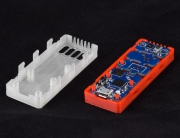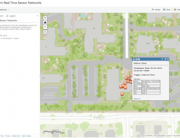
Smart cities redefine people’s lives, and government authorities ensure better citizen-government engagement. IBM defines smart cities “as the ones that use interconnected information to understand and control its operations and optimize the limited resource.”
Global governments have been focusing on smart city initiatives. The ability to improve the quality of life and drive economic growth are the main factors contributing to the popularity of smart cities. A striking example of smart cities is smart lights that dim with the sunrise. Similarly, smart parking spaces help drivers find the right parking space for their vehicles without moving. Smart monitoring systems also help detect gas leakage and alert emergency services during an accident.
Let’s understand how smart cities work with sensors within the infrastructure.
Smart cities majorly depend on data collection and communication between interconnected devices. Here is how it works:
- Data Collection: Smart sensors across the cities collect data in real-time for processing.
- Data Analytics: The data collected from the sensors are analyzed and formed into actionable insights about services and operations.
- Communication: Insights derived here are transmitted to the decision-makers to form strategies.
- Action: Based on the inputs from the last stage, the right steps are determined to improve processes and manage smart city assets.

Key Benefits of Smart Cities
This is the main reason for investing in IoT development services to foster smart cities.
Improved quality of life
Smart cities offer the best quality of life. It streamlines various services using data collection and analytics. Smart cities provide the services that make it easier for the citizens to live. Some great examples include smart traffic monitors, smart energy grids, smart water meters, and more.
An aid to governments
Smart cities bring real-time data about the citizens to the fingertips of the governing authorities. This helps them understand the problems the citizens face and take the right measures to overcome them. They can also plan city development accordingly and operate better. For instance, if they know about the potholes within the city, they can take immediate measures to devise corrective actions.
Reduced Environmental Footprints
Smart cities leverage many solutions such as traffic monitoring, water management systems, smart waste disposal systems, etc. This helps reduce carbon footprints and contributes to a sustainable environment.
Safer Cities
Smart cities are safer than their traditional counterparts. With smart surveillance systems installed across the cities, authorities can detect potentially illegal activities for the police to take the right measures.
Improved Infrastructure
Smart city sensors can help monitor aging roads, bridges, and buildings. You can take a proactive approach to improve the city infrastructure by having the correct data promptly. Besides helping with the city infrastructure, it allows governments to save on the cost of reengineering the amenities.
This guest blog post was written by Pooja Choudhary. Thanks Pooja!

Monitoring Industrial IoT Sensors in Smart Cities
Whether you’re monitoring water wells, flood warning systems, or anything else, sensors from any hardware manufacturer are effectively monitored with Tools.Valarm.net.
Contact Us at Info@Valarm.net, and we’ll help you deploy your effective remote monitoring systems.
Have a look at our IoT Customer Success Stories to learn more about how your organization will improve business operations, and save time and money with effective sensor monitoring solutions.
























































































































































































































































































































